Top RingCentral Alternatives for Business Communication
Written by: Hrishikesh Pardeshi, Founder at Flexiple, buildd & Remote Tools.
Last updated: Feb 06, 2025
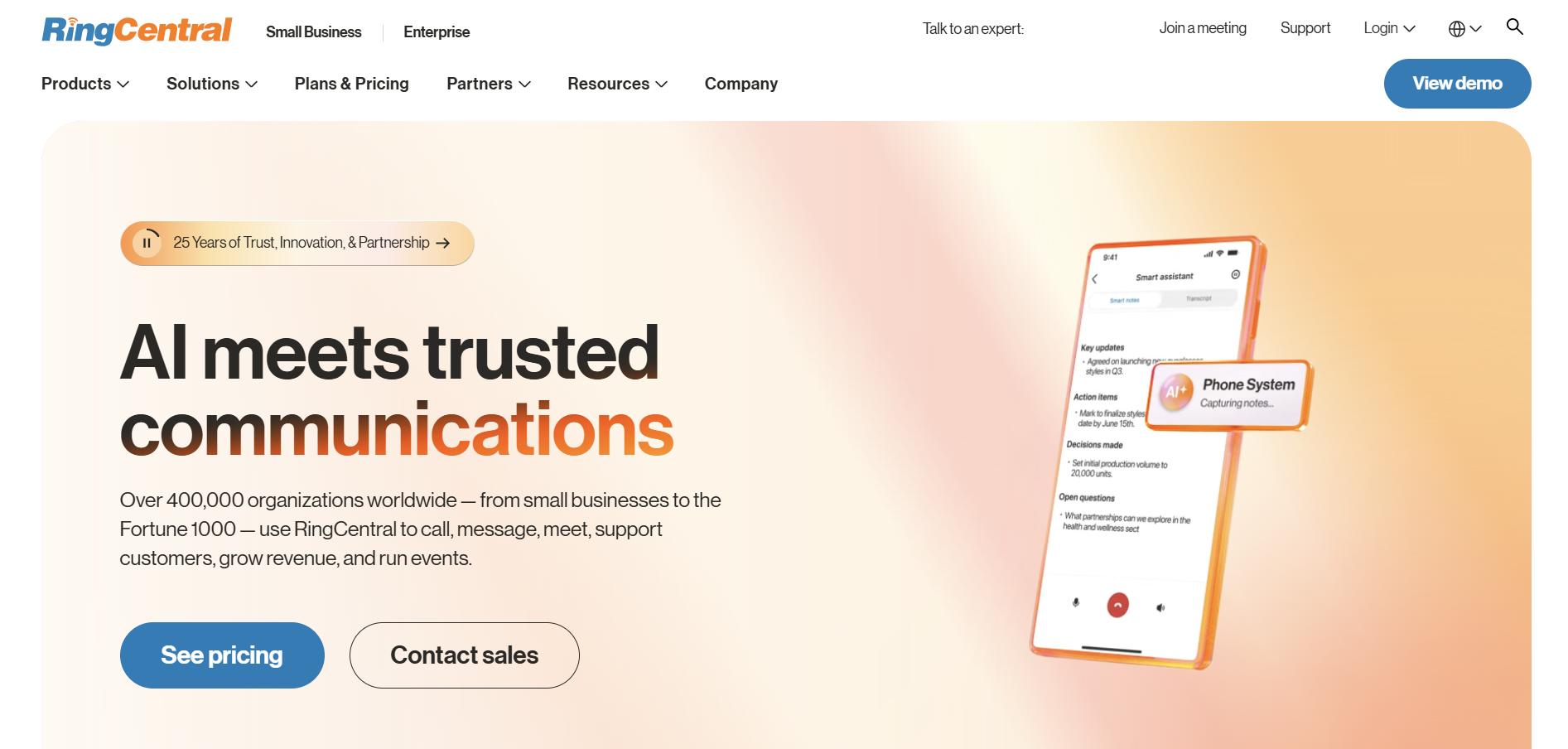
Best RingCentral Alternatives in 2025 are:
Zoom Phone
Microsoft Teams
Grasshopper
Nextiva
8x8
Vonage Business
Dialpad
In the competitive realm of business communication solutions, finding the right alternative to RingCentral can significantly enhance your organization's efficiency and collaboration. Whether you're seeking better integration capabilities, more flexible pricing, advanced features like business phone systems, ring groups, team messaging, and team collaboration tools, or improved customer support, the alternatives listed below offer a range of options tailored to meet diverse business needs. This guide delves into the top RingCentral alternatives, comparing their strengths and weaknesses, and highlighting their desktop and mobile apps to help you make an informed decision for your communication infrastructure in 2025.
Table of Contents
Why Do You Need Alternatives to RingCentral?
Exploring alternatives to RingCentral is essential when your current communication solution doesn't fully meet your organization's evolving needs. Whether it's the demand for more competitive pricing, better integration with existing tools, enhanced collaboration features, or superior customer support, alternatives can provide tailored solutions that align more closely with your business objectives. By evaluating other platforms, you can ensure that your communication infrastructure remains efficient, scalable, and conducive to your team's productivity.
Who Should Consider Using RingCentral Alternatives?
When considering RingCentral alternatives, businesses must assess their unique needs to find the most effective solution. Companies seeking enhanced integration capabilities can turn to platforms like Microsoft Teams and Dialpad, while startups on a budget may find cost-effective options in Grasshopper and Moosend. Enterprises with complex collaboration requirements should explore Nextiva and 8x8, while remote teams in need of reliable communication tools can benefit from Vonage Business and Zoom Phone. Choosing the right alternative depends on the specific features and capabilities required for seamless communication and operational efficiency.
Businesses Seeking Enhanced Integration Capabilities
For businesses that require seamless integration with a variety of software tools and platforms, alternatives like Microsoft Teams and Dialpad offer extensive integration options. These platforms ensure that your communication tools work harmoniously with your existing business applications, enhancing overall productivity and workflow efficiency.
Startups Looking for Cost-Effective Solutions
Startups aiming to manage their communication without incurring high costs can explore options like Grasshopper and Moosend. These alternatives provide robust features at affordable pricing tiers, making them ideal for growing businesses with budget constraints.
Enterprises Requiring Advanced Collaboration Features
Enterprises that prioritize advanced collaboration features and comprehensive communication tools can consider platforms like Nextiva and 8x8. These solutions offer a wide array of functionalities designed to support large teams and complex organizational structures.
Remote Teams Needing Reliable Communication Tools
Remote teams that depend on reliable and consistent communication can benefit from alternatives such as Vonage Business and Zoom Phone. These platforms are built to support remote work environments, offering high-quality voice and video communication capabilities.
RingCentral Alternatives Comparison Table
| Feature | Zoom Phone | Microsoft Teams | Grasshopper | Nextiva | 8x8 | Vonage Business | Dialpad |
|---|---|---|---|---|---|---|---|
| Ease of Use | Easy | Moderate | Easy | Moderate | Moderate | Easy | Easy |
| Pricing | Free & Paid Plans | Free & Paid Plans | Paid | Paid | Free & Paid Plans | Free & Paid Plans | Free & Paid Plans |
| Platform Support | Browser-based | Browser-based | Browser-based | Browser-based | Browser-based | Browser-based | Browser-based |
| Collaboration Features | Extensive | Extensive | Moderate | Extensive | Extensive | Extensive | Extensive |
| Special Features | Video Conferencing Integration | Office 365 Integration | Virtual Phone Numbers | CRM Integration | AI-Powered Analytics | Customizable Call Routing | AI Voice Intelligence |
Best RingCentral Alternatives
Selecting the right alternative to RingCentral can significantly enhance your communication strategies. The following platforms offer a range of features from robust voice and video capabilities to advanced collaboration tools and cost-effective pricing. Whether you're a developer, marketer, small business, or enterprise, these alternatives provide solutions tailored to meet your specific communication needs. Below is a detailed overview of the top RingCentral alternatives to consider for your business operations in 2025.
1. Zoom Phone
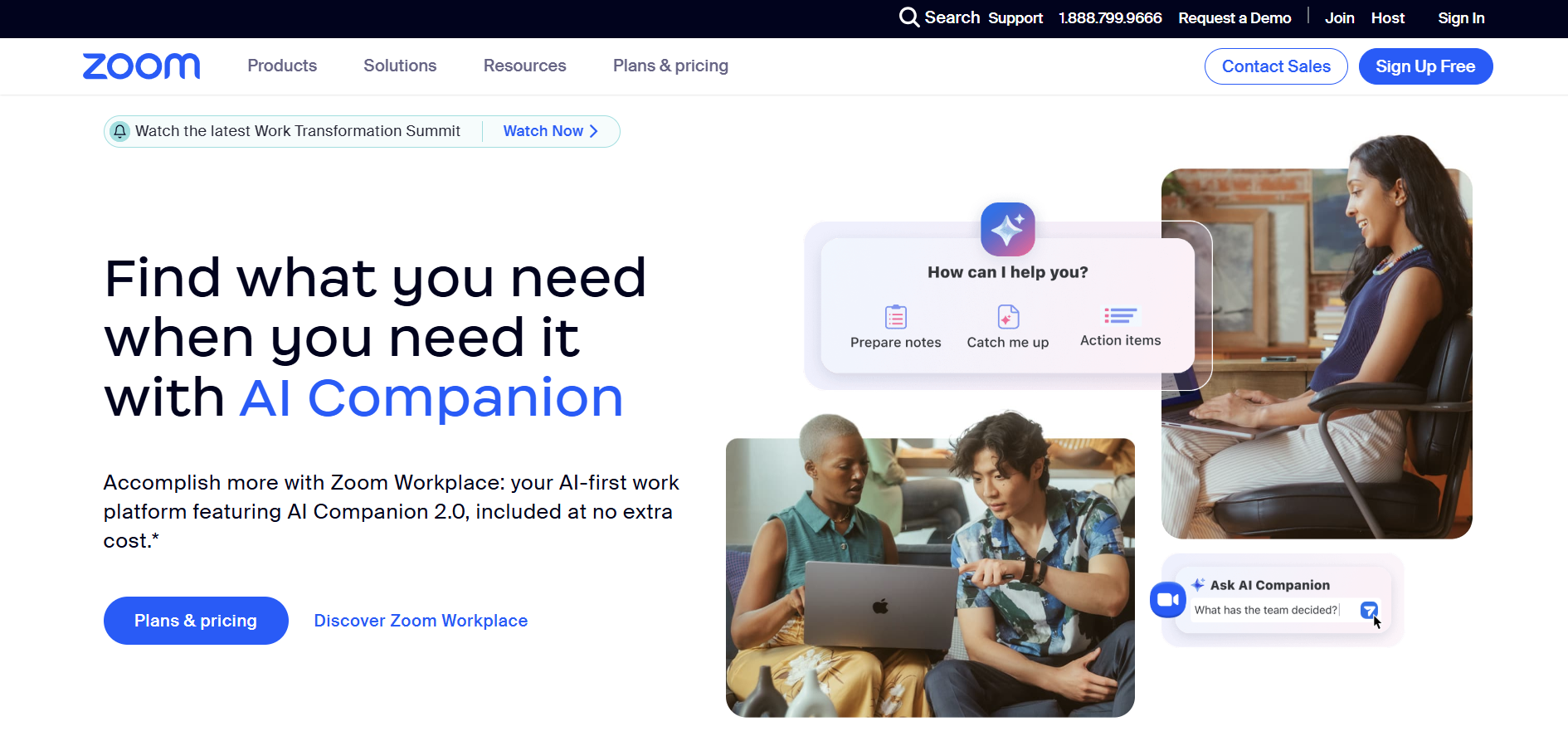
Zoom Phone is a comprehensive cloud phone system that integrates seamlessly with Zoom's video conferencing platform. Designed for businesses of all sizes, Zoom Phone offers high-quality voice communication, advanced call management features, and easy scalability, making it a formidable alternative to RingCentral.
Zoom Phone vs RingCentral
Zoom Phone enhances RingCentral's capabilities by offering seamless integration with Zoom Meetings, enabling businesses to unify their video and voice communications. This integration simplifies workflows and enhances collaboration, providing a more cohesive communication experience.
Key Features of Zoom Phone
Seamless Integration with Zoom Meetings
Advanced Call Management and Routing
Voicemail Transcription and Automated Attendants
Mobile and Desktop Applications for Flexibility
Global Number Availability
Zoom Phone Pros
Unified Video and Voice Communication
User-Friendly Interface and Easy Setup
Scalable for Businesses of All Sizes
High-Quality Voice and Video Calls
Robust Security and Compliance Features
Zoom Phone Cons
Limited Features in Basic Plans
Dependency on Internet Connectivity
Customer Support Response Times Can Vary
Advanced Features May Require Higher-Tier Plans
Integration with Non-Zoom Tools Can Be Limited
Zoom Phone Pricing
Zoom Phone offers a flexible pricing structure as of February 2025. Their plans include a Metered option at $10 per user per month, suitable for occasional users. For those requiring unlimited calling, the Unlimited plan is available at $15 per user per month. The Select plan, priced at $20 per user per month, caters to businesses needing advanced features and integrations.
2. Microsoft Teams
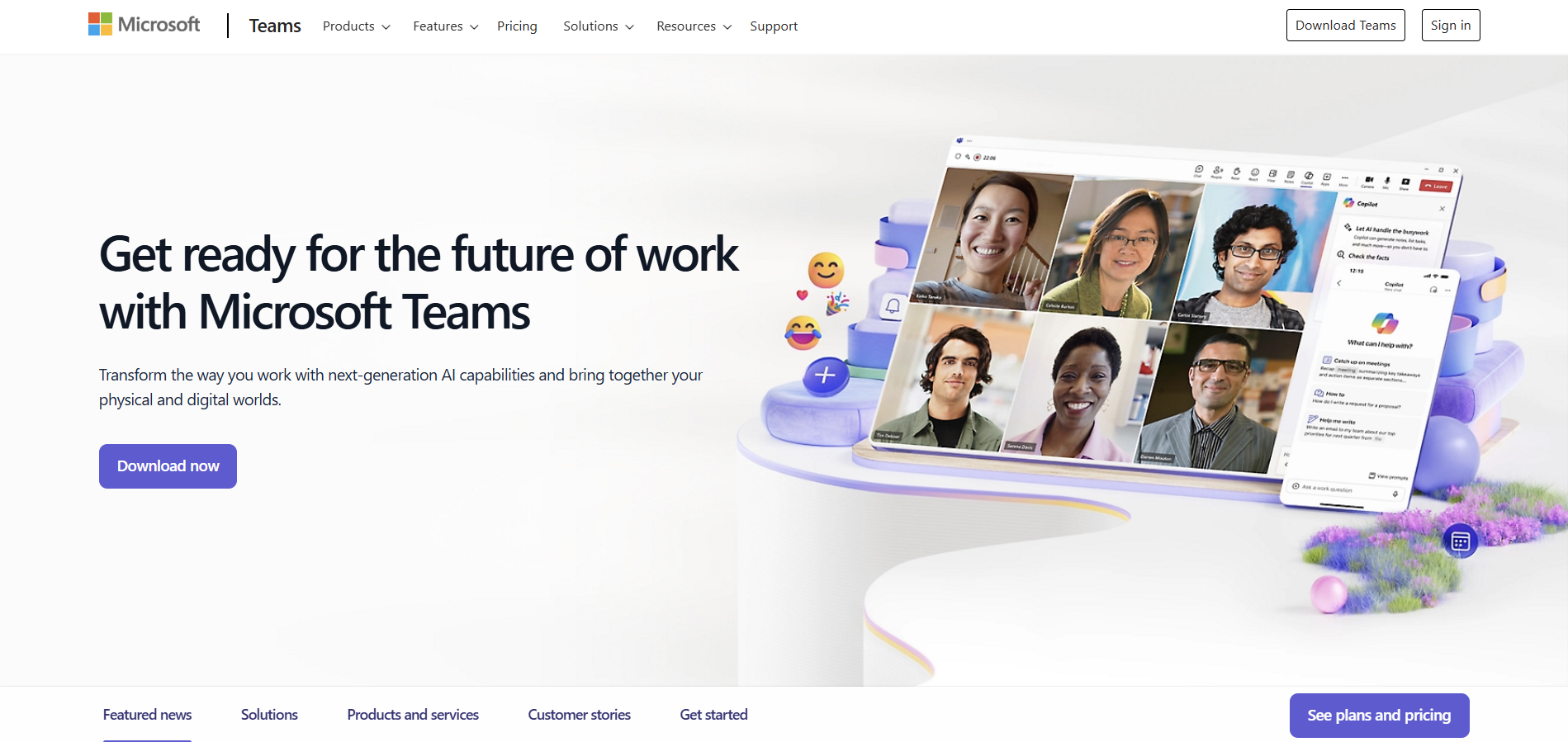
Microsoft Teams is a versatile collaboration platform that combines chat, video conferencing, file storage, and application integration. As a comprehensive communication tool, Microsoft Teams serves as a powerful alternative to RingCentral, especially for organizations already utilizing the Microsoft 365 ecosystem.
Microsoft Teams vs RingCentral
Microsoft Teams offers extensive integration with Microsoft 365 applications, providing a unified platform for communication and collaboration. Unlike RingCentral, which focuses primarily on telephony and video conferencing, Teams encompasses a broader range of collaboration tools, making it ideal for organizations seeking an all-in-one solution.
Key Features of Microsoft Teams
Integrated Chat and Messaging
Video Conferencing and Webinars
File Sharing and Collaboration via SharePoint
Extensive App Integrations and Bots
Advanced Security and Compliance Controls
Microsoft Teams Pros
Deep Integration with Microsoft 365 Suite
Comprehensive Collaboration Tools
Scalable for Large Enterprises
Robust Security and Compliance Features
Customizable Workspaces and Channels
Microsoft Teams Cons
Complexity for New Users
Requires Microsoft 365 Subscription for Full Features
Limited Telephony Features Compared to Dedicated Phone Systems
Resource-Intensive for High-Usage Scenarios
Occasional Sync and Integration Issues
Microsoft Teams Pricing
Microsoft Teams pricing for business plans in 2025 is designed to accommodate various organizational needs. The Teams Essential plan is priced at £3.30 ($4.00) per user per month, offering basic collaboration tools. For more comprehensive features, the Microsoft 365 Business Basic plan is available at £4.90 ($6.00) per user per month, including additional Office 365 applications and services.
3. Grasshopper
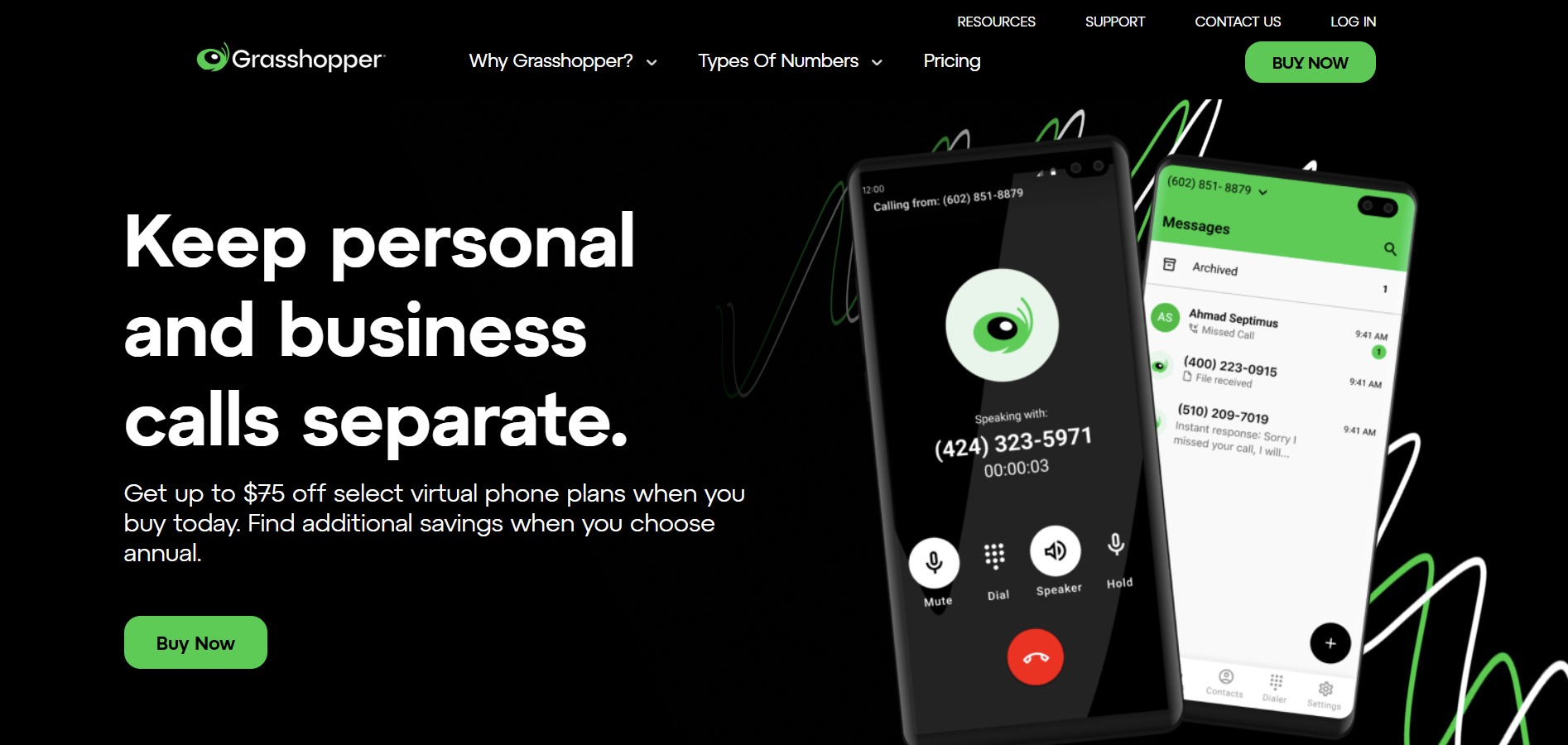
Grasshopper is a virtual phone system designed specifically for small businesses and entrepreneurs. Offering professional call handling features without the complexity of traditional phone systems, Grasshopper is an excellent alternative to RingCentral for businesses seeking simplicity and affordability.
Grasshopper vs RingCentral
Grasshopper provides a straightforward virtual phone system with essential call management features tailored for small businesses. Unlike RingCentral, which offers a wide range of advanced telephony and collaboration tools, Grasshopper focuses on delivering a simple, user-friendly experience for entrepreneurs and small teams.
Key Features of Grasshopper
Virtual Phone Numbers and Extensions
Call Forwarding and Voicemail Transcription
Automated Greetings and Call Routing
Mobile and Desktop Applications for Flexibility
Integrations with Business Tools like Gmail and Salesforce
Grasshopper Pros
Easy Setup and User-Friendly Interface
Affordable Pricing for Small Businesses
Professional Call Handling Features
Reliable Customer Support
Mobile App for On-the-Go Management
Grasshopper Cons
Limited Advanced Features for Growing Businesses
No Video Conferencing Capabilities
Integration Options Are More Limited Compared to Larger Platforms
Scalability Can Be an Issue for Rapidly Growing Teams
Basic Reporting and Analytics
Grasshopper Pricing
Grasshopper's pricing structure in 2025 is tailored to different business sizes. The True Solo Plan, ideal for individual entrepreneurs, is priced at $14 per month. Small teams might opt for the Solo Plus Plan at $28 per month. Growing businesses can choose the Partner Plan at $46 per month, while larger operations may prefer the Small Business Plan at $80 per month. Each tier offers increasing numbers of phone numbers and extensions.
4. Nextiva
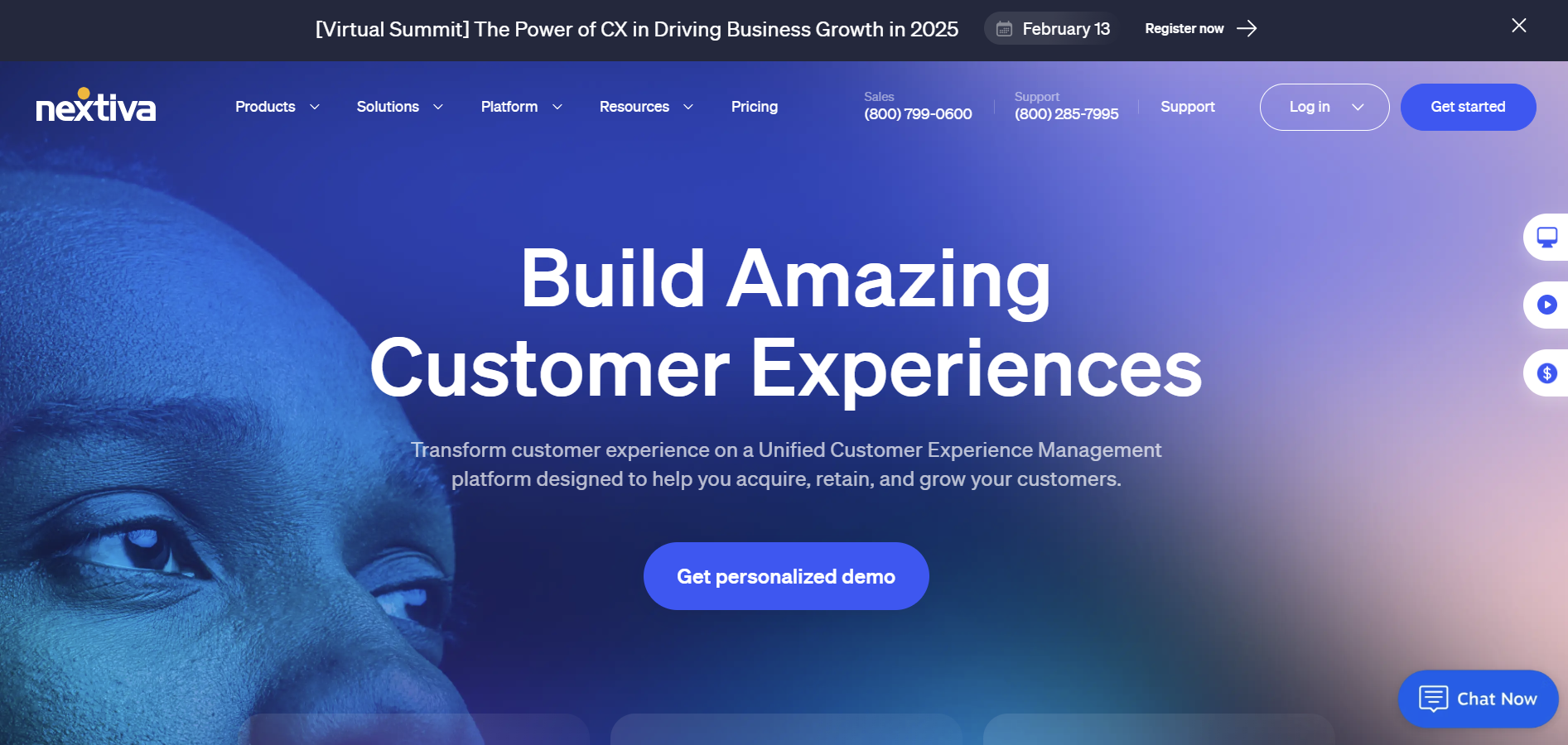
Nextiva is a comprehensive business communication platform that offers VoIP phone services, unified communications, and customer relationship management (CRM) tools. Designed for businesses of all sizes, Nextiva serves as a robust alternative to RingCentral with its extensive feature set and reliable performance.
Nextiva vs RingCentral
Nextiva stands out with its integrated CRM and advanced analytics, providing businesses with deeper insights into their communication workflows. While both platforms offer extensive VoIP and collaboration features, Nextiva's emphasis on customer relationship management makes it a preferred choice for organizations seeking to enhance their customer interactions.
Key Features of Nextiva
VoIP Phone Services with High-Quality Audio
Unified Communications Including Chat and Video
Integrated CRM for Customer Management
Advanced Call Analytics and Reporting
24/7 Customer Support and Technical Assistance
Nextiva Pros
Comprehensive Feature Set Covering Communication and CRM
High Reliability and Uptime
Scalable Solutions for Growing Businesses
User-Friendly Interface with Easy Navigation
Robust Security Measures and Compliance
Nextiva Cons
Higher Pricing Compared to Some Alternatives
Learning Curve for Advanced Features
Limited International Calling Options
Occasional Interface Glitches Reported by Users
Customization Options Can Be Limited in Lower-Tier Plans
Nextiva Pricing
Nextiva's pricing in 2025 is based on a sliding scale, considering factors such as the number of users, chosen service plan, and contract length. Their plans range from $17.95 to $45.95 per month per user, allowing businesses to select a package that best fits their communication needs and budget.
5. 8x8
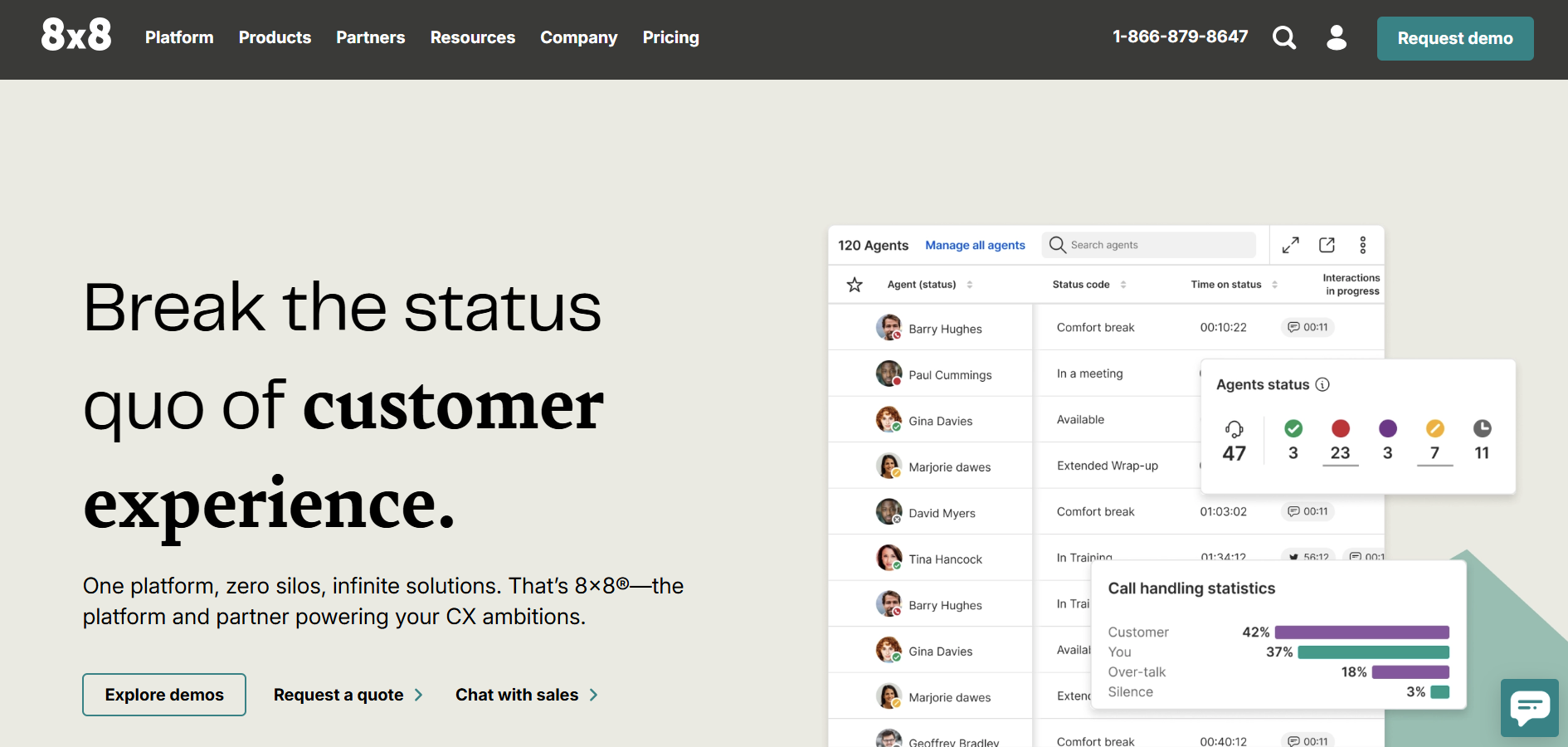
8x8 is a cloud-based communication platform that provides VoIP phone services, video conferencing, and unified communications solutions. Catering to businesses of all sizes, 8x8 offers a versatile alternative to RingCentral with its extensive global reach and comprehensive feature offerings.
8x8 vs RingCentral
8x8 differentiates itself with its global presence, offering reliable communication services across multiple countries. While both platforms deliver robust VoIP and collaboration tools, 8x8's emphasis on international calling and multilingual support makes it an ideal choice for global businesses and remote teams.
Key Features of 8x8
VoIP Phone Services with International Calling
Video Conferencing and Webinars
Unified Messaging and Collaboration Tools
Advanced Call Routing and Management
Comprehensive Analytics and Reporting
8x8 Pros
Extensive International Calling Options
Scalable Solutions for Global Businesses
High-Quality Voice and Video Communications
User-Friendly Interface and Easy Setup
Robust Security and Compliance Features
8x8 Cons
Higher Pricing for International Features
Limited Customization in Basic Plans
Customer Support Can Be Slow During Peak Times
Occasional Connectivity Issues Reported
Advanced Features May Require Premium Plans
8x8 Pricing
8x8 offers tiered pricing plans in 2025, designed to cater to various business requirements. Their X2 plan, priced at $24 per user per month when billed annually, provides essential communication features. The X4 plan, at $44 per user per month, offers advanced capabilities. For enterprises requiring comprehensive solutions, the X6 plan is available at $85 per user per month, all billed annually.
6. Vonage Business
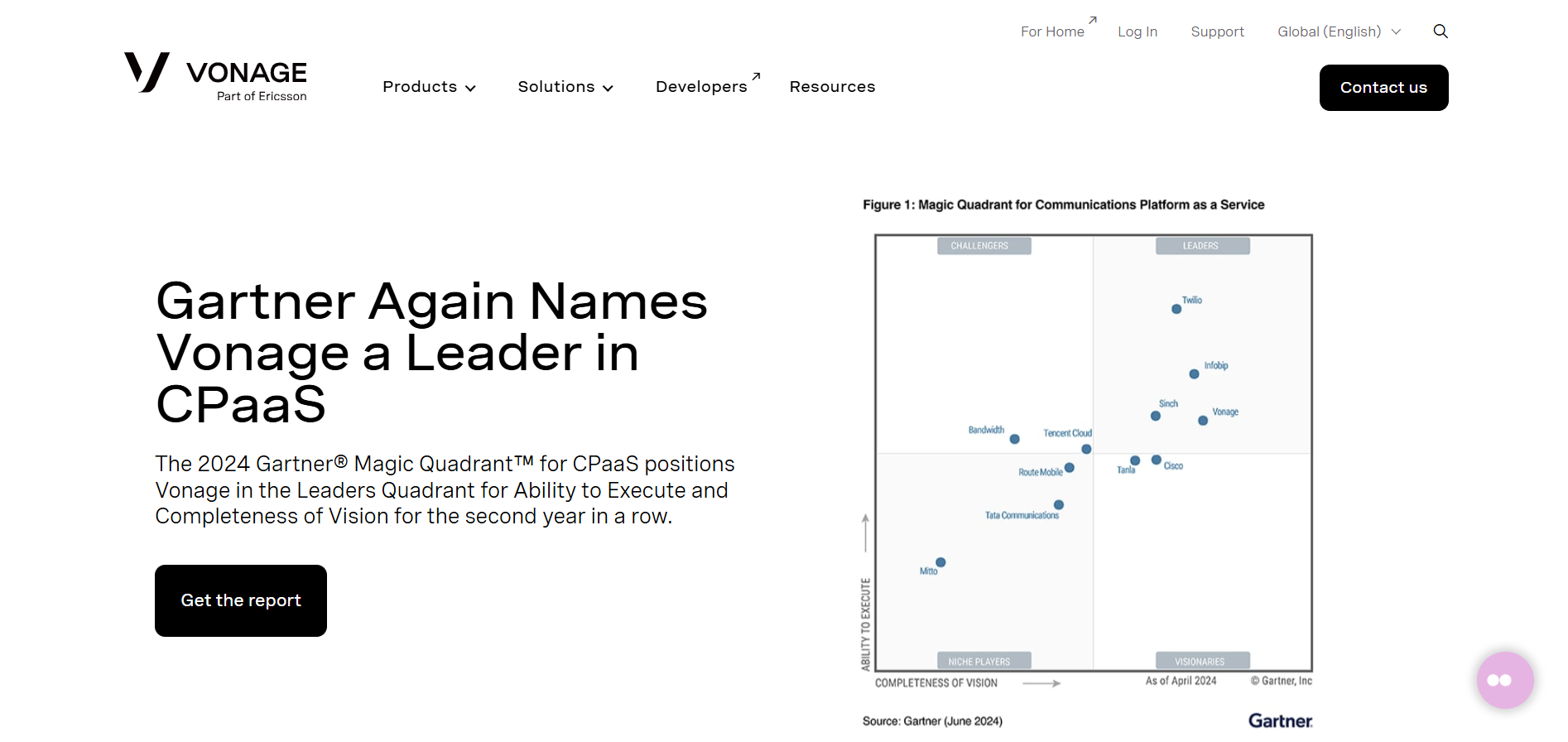
Vonage Business is a cloud-based communication platform that offers VoIP phone services, unified communications, and customer engagement tools. With its flexible solutions and robust feature set, Vonage Business serves as a reliable alternative to RingCentral for businesses seeking comprehensive communication services.
Vonage Business vs RingCentral
Vonage Business excels in providing customizable communication solutions tailored to specific business needs through both mobile and desktop apps. Unlike RingCentral, which offers a standardized suite of tools, Vonage Business allows for greater flexibility in configuring communication services, making it suitable for businesses with unique or evolving requirements.
Key Features of Vonage Business
VoIP Phone Services with Flexible Plans
Unified Communications Including Chat and Video
Customer Engagement Tools and CRM Integrations
Advanced Call Management and Routing
Detailed Analytics and Performance Reporting
Vonage Business Pros
Highly Customizable Communication Solutions
Flexible Pricing Plans to Suit Various Budgets
Strong CRM and Integration Capabilities
Reliable Customer Support and Technical Assistance
User-Friendly Interface with Easy Navigation
Vonage Business Cons
Higher Costs for Advanced Features
Limited International Calling in Basic Plans
Complexity in Setting Up Custom Configurations
Customer Support Response Times Can Vary
Occasional Service Interruptions Reported by Users
Vonage Business Pricing
Vonage Business offers a tiered pricing structure as of February 2025, designed to cater to various business needs. Their Mobile plan starts at $19.99 per user per month, the Premium plan at $29.99, and the Advanced plan at $39.99, all based on monthly billing. Vonage incentivizes annual commitments with a substantial 30% discount, bringing the costs down to $13.99, $20.99, and $27.99 per user per month respectively. For mid-sized businesses with 20-99 users, Vonage provides even more competitive rates, starting as low as $10.49 for the Mobile plan. Additional features like call recording and automatic queuing are available for extra fees.
7. Dialpad
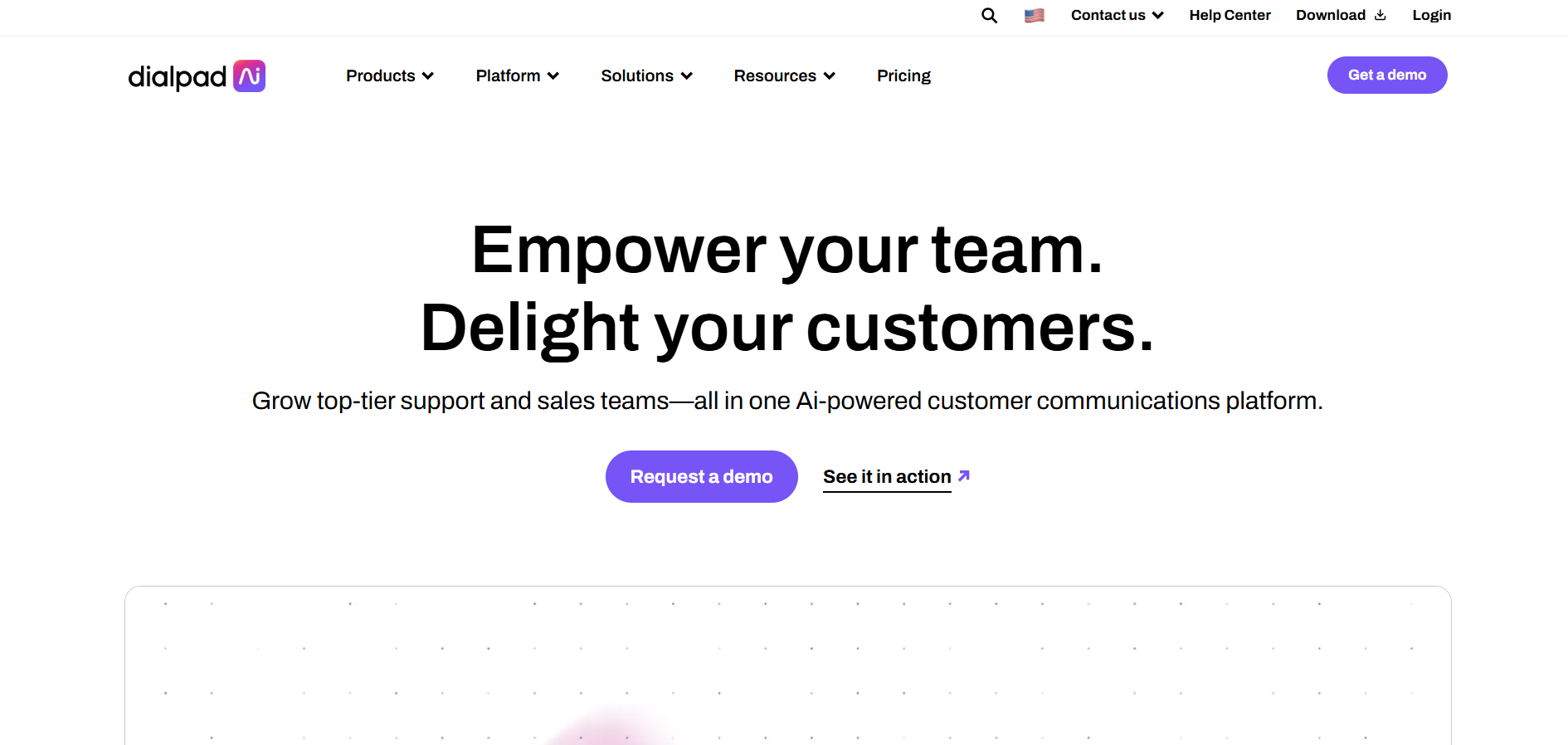
Dialpad is a modern cloud-based communication platform that offers VoIP phone services, video conferencing, and unified communications solutions powered by artificial intelligence. Designed for businesses of all sizes, Dialpad provides an innovative alternative to RingCentral with its focus on AI-driven insights and seamless user experience.
Dialpad vs RingCentral
Dialpad leverages artificial intelligence to enhance communication workflows, offering features like real-time transcription and sentiment analysis. While both platforms provide robust VoIP and collaboration tools, Dialpad's AI capabilities offer a more advanced and insightful communication experience, making it ideal for businesses looking to leverage technology for improved productivity.
Key Features of Dialpad
AI-Powered VoIP Phone Services
Real-Time Transcription and Sentiment Analysis
Video Conferencing and Screen Sharing
Unified Messaging and Collaboration Tools
Comprehensive Call Analytics and Reporting
Dialpad Pros
Innovative AI-Driven Communication Features
User-Friendly Interface with Easy Setup
High-Quality Voice and Video Communications
Seamless Integration with Business Tools
Scalable Solutions for Growing Businesses
Dialpad Cons
Higher Pricing for AI Features
Limited International Calling in Basic Plans
Learning Curve for AI-Enhanced Features
Customer Support Can Be Inconsistent
Advanced Features May Require Premium Plans
Dialpad Pricing
Dialpad's pricing model in February 2025 is structured to accommodate businesses of different sizes and requirements. Their Standard plan is priced at $15 per user per month when billed annually, or $27 if billed monthly. This plan includes essential features like phone calls, call recording, and an auto attendant. The Pro plan, offering more advanced features on a unified communications platform, costs $25 per user per month with annual billing or $35 monthly. For large enterprises with specific needs, Dialpad offers an Enterprise plan with custom pricing, suitable for a comprehensive contact center solution.
Notably, Dialpad includes AI features even in its Standard plan, with more sophisticated capabilities available in higher tiers. As with most business communication services, the final cost for both Vonage and Dialpad may vary based on specific business requirements, user count, and any current promotional offers.
FAQs on RingCentral Alternatives
1. What are the top alternatives to RingCentral?
The top alternatives to RingCentral include Zoom Phone, Microsoft Teams, Grasshopper, Nextiva, 8x8, Vonage Business, and Dialpad. These platforms offer diverse features for VoIP phone services, unified communications, video conferencing, and collaboration tools, catering to businesses of all sizes and industries.
2. Why should I consider using an alternative to RingCentral?
You should consider using an alternative to RingCentral if you require features like more flexible pricing, enhanced integration capabilities, advanced collaboration tools, improved customer support, or specialized functionalities tailored to your specific business needs. Exploring alternatives allows you to find a platform that best aligns with your organizational objectives and communication requirements.
3. Are RingCentral alternatives free to use?
Many RingCentral alternatives offer free plans or trial periods with basic features. For instance, Microsoft Teams provides a free tier with limited functionalities, Dialpad offers a free trial for new users, and Grasshopper has a trial period for testing its virtual phone services. However, most platforms also have premium plans that unlock advanced features, higher usage limits, and priority support.
4. Which RingCentral alternative is best for small businesses?
For small businesses, Grasshopper and Vonage Business are excellent choices due to their affordability, ease of use, and essential call management features. Grasshopper offers virtual phone systems tailored for entrepreneurs, while Vonage Business provides customizable communication solutions that can scale as your business grows.
5. Can I use RingCentral alternatives for remote teams?
Yes, many RingCentral alternatives are well-suited for remote teams. Zoom Phone and Microsoft Teams offer robust video conferencing and collaboration tools, making them ideal for teams working remotely. Dialpad also provides seamless integration with various business applications, enhancing remote communication and productivity.